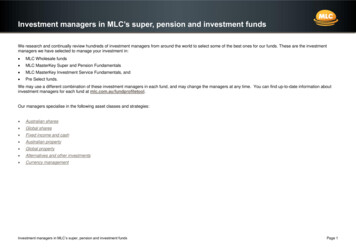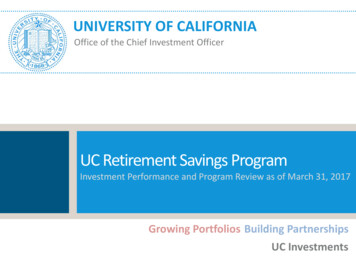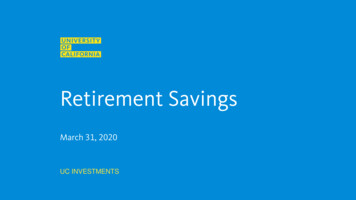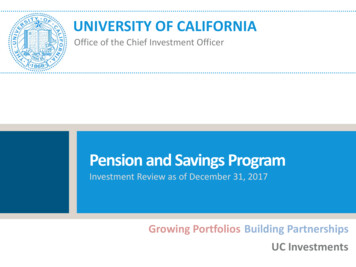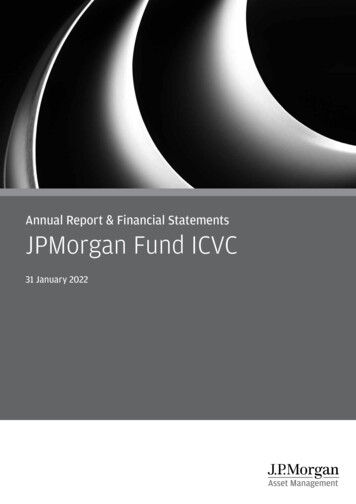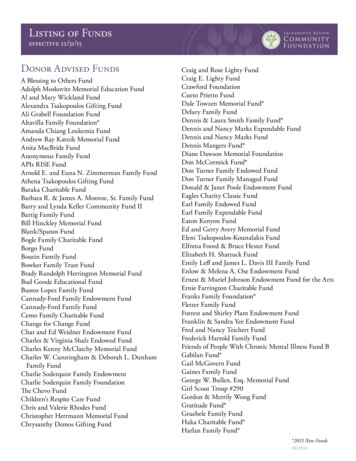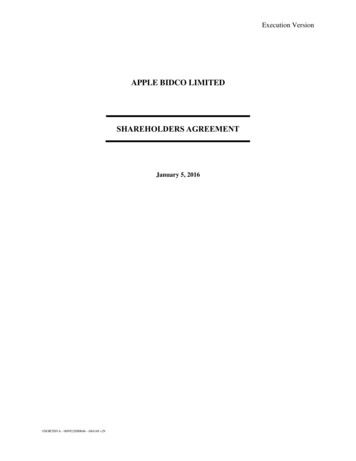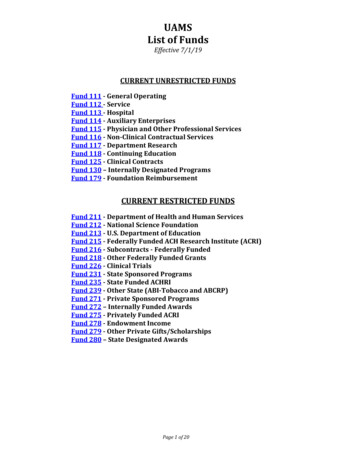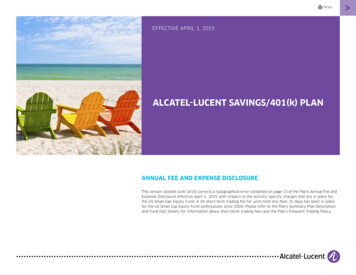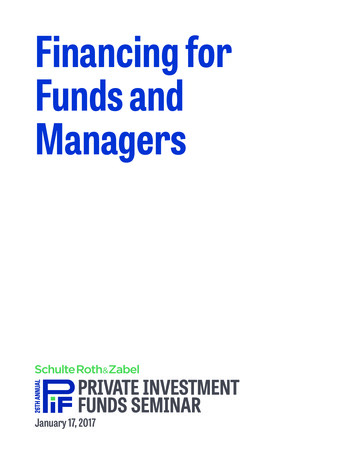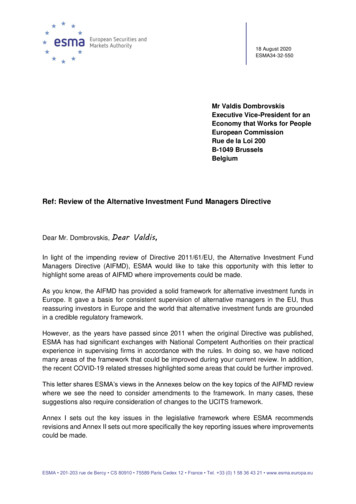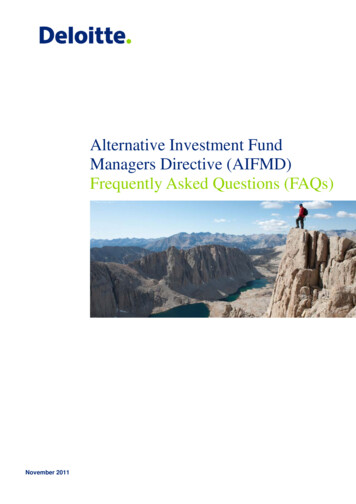
Transcription
Alternative Investment FundManagers Directive (AIFMD)Frequently Asked Questions (FAQs)November 2011
ContentsScopeIn a nutshell, what is the AIFMD?3Who is subject to the AIFMD?3Can an Alternative Investment Fund be distributed to EU retail investors?4Can an EU feeder AIF with a non EU master AIF benefit from the European passport underthe AIFMD?4Is it compliant with the AIFMD if a Luxembourg management company delegates it portfoliomanagement functions for an Alternative Investment Fund to a US AIF Manager?4Is it compliant with the AIFMD if a US management company delegates it portfoliomanagement functions for an EU Alternative Investment Fund to an EU AIF Manager?4Organisational requirementsDoes an Alternative Investment Fund marketed in the European Union to institutionalinvestors need to be managed by an EU AIFM?5Can a UCITS management company also act as an AIFM?5Can a MiFID firm act as an AIFM?5Can an AIF have multiple AIFM (for example an EU AIFM and a non-EU AIFM)?5ValuationDoes an EU AIFM need to appoint an external valuator?5LeverageIs there any leverage limitation for the AIFs marketed in the EU?6DepositaryDoes an AIF need to appoint a depositary in its home country?6Can the depositary be the same entity charged with the risk management functions of theAlternative Investment Fund?6DelegationMay an EU AIFM delegate the portfolio management to an asset manager based outside ofthe European Union?6Risk managementAre the risk management requirements under AIFMD similar to those for UCITS?7Reporting/disclosure requirementsAre the reporting and disclosure requirements lighter under the AIFMD than those requiredfor UCITS?7Regulatory technicalitiesWhen will the directive come into force?7When will EU-passporting and non-EU passporting come into force and what does thismean?7What are the marketing routes into the EU?8Will it still be possible to use private placement?8To what extent is this a regulatory burden? Will this lead to AIF managers moving offshore?8Is there any legislation similar to the AIFMD in other countries?9AIFMD - FAQs2 / 10
Managing rapid change to maintain competitiveness is a vital skill in the investment fundsindustry.The drafting of the Alternative Investment Fund Managers Directive illustrates this point. Havingfollowed over 18 months of drafting and redrafting of proposals, the path leading to the finaldraft with the ongoing dialogue over differing approaches has been long and difficult. Continualchange of position may have made it difficult to keep up and questions do arise, particularly asa result of there being several contrasting versions.We have therefore compiled some frequently asked questions and provided you with theiranswers.ScopeIn a nutshell, what is the AIFMD?The AIFM-Directive is a European Union Directive which is due to be transposed into EuropeanUnion Member States' national law by 2013. It seeks to regulate the previously lightly regulatedinvestment fund sector, in particular hedge funds, private equity funds and real estate funds.Essentially, all non-UCITS come within the scope of the AIFMD unless they fall under theexception clause (less than EUR 100 million or less than EUR 500 million unleveraged andwhich do not grant investors redemption rights for a period of 5 years following the date ofconstitution of each AIF).Following the recent financial crisis the Alternative Investment Fund Managers Directive seeksto regulate and harmonise EU and non-EU AIF Managers acting within the EU. It is important tonote that the AIFMD is not regulating AIFs but rather the Managers of these funds.Who is subject to the AIFMD?All alternative investment funds managers established in the European Union, whether theymanage EU or non-EU AIF, are subject to the AIFMD. The AIFMD also governs the marketingin the EU of AIF managed by an AIFM established outside the EU. It is important to note that anon-EU AIFM marketing outside of the EU a non-EU fund which invest in EU equities does notcome within the scope of the AIFMD, as this would involve product regulation and the AIFMD isregulating the AIF managers.The alternative investment funds under AIFMD cover all the main investment funds other thanUCITS. This includes the Luxembourg specialized investment funds (SIF) governed by theLuxembourg law of 13 February 2007 and the Luxembourg investment companies in risk capital(SICAR) governed by the law of 15 June 2004, funds set up under Part II of the law of 17December 2010 on Undertakings for Collective Investment, unless they fall under the generalexceptions: less than EUR 100 million or less than EUR 500 million unleveraged and which do not grant investors redemptionrights for a period of 5 years following the date of constitution of each AIFThese types of vehicles may also be able to benefit from an exemption based on theirinvestment policy or the size of their assets.AIFMD - FAQs3 / 10
Can an Alternative Investment Fund be distributed to EU retail investors?The EU Passport introduced by the AIFMD allows an AIFM to market the shares of an AIF toprofessional investors - by contract the marketing of AIF to retail investors remains in thediscretion of each Member State. E.U. Where Member States permit the marketing of AIF toretail investors they can impose stricter requirements.Can an EU feeder AIF with a non EU master AIF benefit from the Europeanpassport under the AIFMD?A feeder fund only has access to the EU Passport if the master fund has the ability to obtain theEU Passport itself. A feeder AIF is defined as an AIF investing at least 85% of its assets intoanother AIF (the master AIF).Is it compliant with the AIFMD if a Luxembourg management companydelegates it portfolio management functions for an Alternative InvestmentFund to a US AIF Manager?Despite the delegation, the Luxembourg management company should be considered as theAIFM under the AIFMD, responsible for the compliance with the AIFMD as the case may be.The US AIF manager must however be supervised in the US and be submitted the to theLuxembourg management company's due diligence check.Is it compliant with the AIFMD if a US management company delegates itportfolio management functions for an EU Alternative Investment Fund toan EU AIF Manager?Despite the delegation, the U.S. management company should be considered as the AIFMunder the AIFMD, responsible for the compliance with the AIFMD as the case may be.In the case where the E.U. AIFs are distributed in the E.U.:The U.S. management company will have to comply with the AIFMD requirements, i.e.: Voluntary submission of the AIFM to the directive; Monitoring by third country regulator.In addition, the third country where the AIFM is established, the U.S. in the case at hand, mustfulfill the following conditions: AML standards Existence of information exchange agreement Tax information exchange standards Reciprocal access to marketsIn the case where the E.U. AIFs are not distributed in the E.U.:We understand that in such a case, the U.S. management company will not have to comply withthe AIFMD being not subject to the latter.AIFMD - FAQs4 / 10
Organisational requirementsDoes an Alternative Investment Fund marketed in the European Union toinstitutional investors need to be managed by an EU AIFM?An AIF marketed in the E.U. to institutional investors (or to any well-informed investors) needs: Either to be managed by an E.U. AIFM, Or to be managed by an non-E.U. AIFM which complies with the AIFMD, i.e. the countrywhere the AIF is established must fulfill 4 conditions : AML standards (FATF/GAFI) Existence of information exchange agreement between home country and the EUmember state Tax information exchange standards procal access to markets (the non-E.U. AIFM shall voluntary submit itself to theAIFMD and must be monitored by third country regulator)Can a UCITS management company also act as an AIFM?Authorised managers of a UCITS are entitled to request to be authorised as AIFM and viceversa, subject only to complying with any relevant additional requirements for the newauthorisation.Can a MiFID firm act as an AIFM?MiFID firms that fall into the scope of the AIFM will need to submit an application to re-authoriseas an AIFM. The scope of MiFID services that AIFM can undertake is narrower and includes: Non-core services: comprising:(i) investment advice; (ii) safe-keeping and administrationin relation to shares or units of collective investment undertakings; (iii) reception andtransmission of orders in relation to financial instruments; and Individual portfolio management: Management of portfolios of investments, includingthose owned by pension funds and institutions for occupational retirement provision inaccordance with Article 19(1) of Directive 2003/41/EC, in accordance with mandates givenby investors on a discretionary, client-by-client basis;Can an AIF have multiple AIFM (for example an EU AIFM and a non-EUAIFM)?Each AIF managed within the scope of the AIFMD shall only have one single AIFM, responsiblefor the compliance with the requirements of the AIFMD.ValuationDoes an EU AIFM need to appoint an external valuator?The AIFM must appoint a valuator either legally or functionally independent, hence the valuatordoes not need to be external to the extent that it can be evidenced that he is functionallyindependent. However, should no external valuator be appointed, the competent authority of theE.U. Member State may require the AIFM to have its valuation procedures and / or valuationsverified by an external auditor.AIFMD - FAQs5 / 10
LeverageIs there any leverage limitation for the AIFs marketed in the EU?Any AIFM managing one or more AIF using leverage will have to provide the competentauthorities of its home Member State regular information concerning its leverage.The concerned Member State regulator will inform the ESMA of the leverage limits disclosedand the latter may decide to limit the level of leverage used if it considers that the leverageemployed by an AIFM may pose a substantial risk to the stability and integrity of the financialsystem.DepositaryDoes an AIF need to appoint a depositary in its home country?For an E.U. AIF:A depositary of an EU AIF must have registered office in the E.U. Member State of the AIF forthe first 4 years and thereafter any EU Member State.For a non-E.U. AIF:A depositary of non-E.U. AIF managed by an authorised AIFM must have a registered office inthe E.U., unless: The regulator of the AIFM and the third country of domiciliation of the AIF hassigned a cooperation agreement; The third country of the AIF is subject to an effective prudential regulation andsupervision; The depositary is contractually liable to the AIFM and investors of the AIF; The third country of the AIF meets the FATF/GAFI standards on money laundering andterrorist financing; The AIFM's home state has signed an OECD model tax convention agreement with thethird country of domiciliation of the AIF; and The depositary is a bank or an entity of the same nature as those authorised to act assuch in the E.U.Can the depositary be the same entity charged with the risk managementfunctions of the Alternative Investment Fund?The depositary of an AIFM shall not be in charge of the risk management function the portfoliomanagement or the liquidity management functions.DelegationMay an EU AIFM delegate the portfolio management to an asset managerbased outside of the European Union?An E.U. AIFM may only delegate the portfolio management of its AIF to an authorised AIFM tomanage an AIF of the same type, hence such delegation is subject to the supervision of theAIFM by its home country regulator.In addition, the third country where the AIFM is established must fulfill the following conditions: AML standardsAIFMD - FAQs6 / 10
Existence of an information exchange agreement Tax information exchange standards Reciprocal access to marketsRisk managementAre the risk management requirements under AIFMD similar to those forUCITS?The main provisions governing the risk management under AIFMD are inspired by the riskmanagement regulations governing the UCITS, accordingly we assume that the riskmanagement requirements will be similar to those for UCITS, however the AIFMD is notdetailed enough to answer this question with certainty. Therefore, this question will be reviewedin light of the level 2 directive (ESMA guidance is expected November 2011 and theCommission final draft expected Q2 or Q3 2012.Reporting/disclosure requirementsAre the reporting and disclosure requirements lighter under the AIFMDthan those required for UCITS?The requirements of disclosure to the investors under the AIFM Directive are higher in variousrespects than for UCITS, which could be explained by certain specificities of the AIF. In fact, theAIF are less regulated than UCITS, in particular regarding the use of leverage, their investmentpolicy, the short-selling practice etc., which are key elements in the determination of the risklevel. Therefore, investors may need additional information related thereto.As for the disclosure requirements, the provisions governing the reporting requirements underAIFMD are inspired from those for UCITS while being adapted to the specificities of the AIF asaforementioned.Regulatory technicalitiesWhen will the directive come into force?Twenty days after its publication in the EU official journal the AIFM Directive will come intoforce. It has not yet been published but is expected very soon (Q3 2011).When will EU-passporting and non-EU passporting come into force andwhat does this mean?The EU passport should be available for EU AIFM managing EU AIF as soon as the directive isimplemented in 2013.The non-EU passport may become available to non-EU AIFM and non-EU AIF managed by EUAIFM from 2015, but this is subject to the success of the EU internal passport which shall bebased on an evaluation to be conducted by ESMA.AIFMD - FAQs7 / 10
What are the marketing routes into the EU?Private placement - The Directive permits national regulators to continue with their existingprivate placement regime, on the condition that that AIFM comply with thedisclosure/transparency regime to investors and regulators, including the Annual Reportrequirements. Cooperation agreements will need to be in place between the FSA and thejurisdictions where non-UK AIF/AIFM are domiciled. I.e. for a Cayman fund there must be acooperation agreement (containing certain minimum elements) between the UK FSA and CIMA.The private placement route may be turned off in 2018, but this depends on a decision fromESMA.EU Passport - The EU passport should be available for EU AIFM and EU AIF as soon as thedirective is implemented in 2013, This means that AIFM will be able to market AIF across theEU on the basis of one authorisation with their home member state. The EU passport maybecome available to non-EU AIFM and non-EU AIF from 2015, but this is subject to an opinionfrom ESMA.Offshore structures - The domicile of the non-EU AIFM/AIF must meet certain requirementsas a precondition for either of the above two marketing routes.Will it still be possible to use private placement?Initially yes, however the future of national private placement regimes is highly dependent onthe success, or not, of the passporting which shall be revealed after the ESMA review in 2018.To what extent is this a regulatory burden? Will this lead to AIF managersmoving offshore?Existing AIFs have a grandfathering period to be able to carefully consider the implications ofthe AIFMD and how best to handle them. Newly created funds will need to decide upon creationwho their intended investors will be and where they will based - i.e. EU or non-EU. The AIFMDwill be a regulatory burden in comparison to current practice, however this is because the sectoris currently very lightly regulated and one of the key aims of the AIFM Directive is to providegreater harmonisation and regulation.The passport regime, if successful has the potential to be a positive advantage for EUmanagers, particularly in the early stages prior to the non-EU passport being in place. Thecontinued existence in parallel of national private placement regimes, accessible to third countrymanagers and funds from outside of the EU could lead to a cost-advantage for them prior to thedirective review to be conducted in 2018.There is also the question of whether managers (or investors) will want to bear the additionalregulatory costs of the directive for their funds aimed at non-EU investors. Overall there may bemovement in both directions, onshore as well as offshore, but neither side seems to hold acompetitive advantage over the other. Additionally some AIFMs are opting for co-domiciliationonshore and offshore.This movement will most certainly depend on the various stakeholders' interests.AIFMD - FAQs8 / 10
Is there any legislation similar to the AIFMD in other countries?In the wake of the recent financial crisis, the G20 committed to ensure that "all relevantactors.are subject to appropriate regulation and oversight", which reflected the globalconsensus for tighter regulation of the AIF sector. Various supranational, international andnational initiatives have been launched to towards achieving this goal.In the United States of America, the Dodd-Frank Wall Street Reform and Consumer ProtectionAct was passed in July 2010, but not yet implemented. Like the AIFM Directive in the EU, theDodd Frank Act was brought about as a result of the recent financial crisis. It regulates the fullspectrum of financial services.AIFMD - FAQs9 / 10
ContactLou KieschPartner - Regulatory Consultinglkiesch@deloitte.luXavier ZaegelPartner - Capital Markets/Financial Risk Leaderxzaegel@deloitte.luBenjamin LamPartner - Private Equity & Real Estate Leaderblam@deloitte.luRaymond KrawczykowskiPartner - Tax Leaderrkrawczykowski@deloitte.luMarc NoirhommeDirecteur - Regulatory Consultingmnoirhomme@deloitte.luDeloitte is a multidisciplinary service organisation which is subject to certain regulatory and professional restrictions on thetypes of services we can provide to our clients, particularly where an audit relationship exists, as independence issues andother conflicts of interest may arise. Any services we commit to deliver to you will comply fully with applicable restrictions.About Deloitte Touche Tohmatsu Limited:Deloitte refers to one or more of Deloitte Touche Tohmatsu Limited, a UK private company limited by guarantee, and itsnetwork of member firms, each of which is a legally separate and independent entity. Please seewww.deloitte.com/lu/about for a detailed description of the legal structure of Deloitte Touche Tohmatsu Limited and itsmember firms.Deloitte provides audit, tax, consulting, and financial advisory services to public and private clients spanning multipleindustries. With a globally connected network of member firms in more than 150 countries, Deloitte brings world-classcapabilities and high-quality service to clients, delivering the insights they need to address their most complex businesschallenges. Deloitte has in the region of 200,000 professionals, all committed to becoming the standard of excellence. 2014 Deloitte Tax & Consulting
retail investors they can impose stricter requirements. Can an EU feeder AIF with a non EU master AIF benefit from the European passport under the AIFMD? A feeder fund only has access to the EU Passport if the master fund has the ability to obtain the EU Passport itself. A feeder AIF is defined as an AIF investing at least 85% of its assets into
